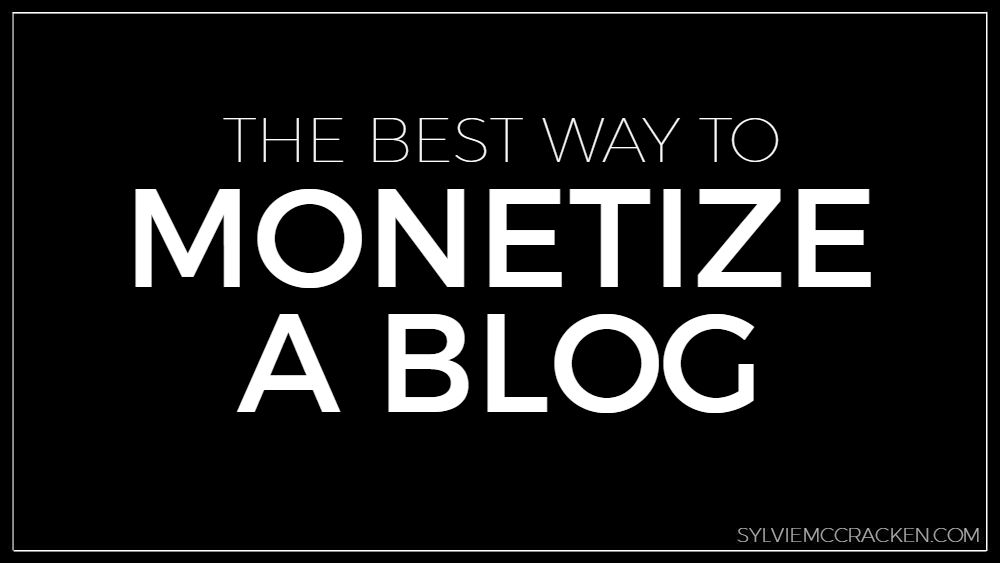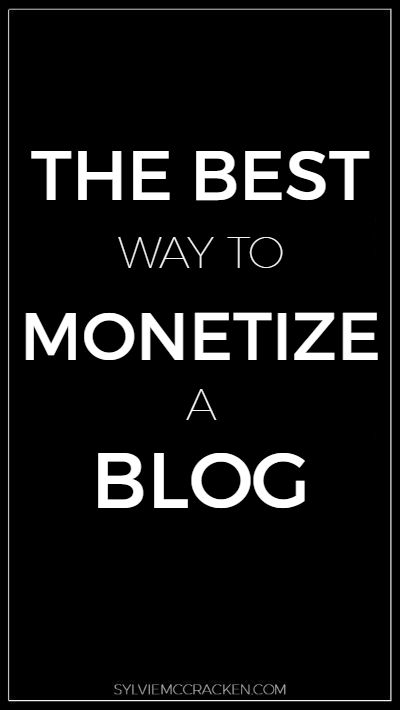
So you have a topic you're passionate about and you want to share it with the world, but you don't want to do it as a hobby. Perhaps you're doing it to earn some money on the side or perhaps you're looking to replace your day job income with it like I did.
Awesome!
The truth is there are a lot of different ways to monetize a blog.
So what's the BEST way to monetize a blog? Even better: what's the best way to monetize a blog FAST.
And let's take that a step further….
How do you monetize a blog with mostly passive income (as in money that comes in while you sleep).
First let's talk about a few of the most common blog monetization options:
Advertising Income
The first thing that comes to mind for people when I mention monetizing a blog is running ads (like Google Adsense). That's definitely one way to do it but it's not my favorite.
Here's why:
Monetizing a blog solely with ads requires a lot of traffic (to make a decent income) which takes quite a bit of time. If you decide to go that route you'll need to focus on learning SEO (search engine optimization) and will likely need to blog often (ideally daily). I know that if I tried to crank out a daily blog post the quality of my content would suffer so it's not a style that works for me right now. I'd much rather put out 1 great blog post per week and focus on reaching my ideal readers instead of the masses.
To clarify though, I'm not against running ads on your site. I don't run them at the moment but I have in the past and who knows, I may do it again in the future but I can tell you they'll never be the biggest chunk of my income.
Another thing to keep in mind with ads is that you can choose to restrict certain categories (as in categories you don't want to show on your site). Restricting categories will impact your income (the more you restrict, the less you earn). As an example, when I ran ads on my health site some of the categories I restricted were food and beauty products, because writing about nutrition and running an ad for Cheetos would have been a little weird to say the least.
If you want to give ads a shot I would start with Google Adsense, the easiest to get started with, and look into other networks and learn more about optimizing ads after that.
Affiliate Commission
Another way to monetize a blog that you might have heard of or experimented with is affiliate income.
I think this is a great way to start monetizing when you first get started and I'll definitely talk more about this in a future post but for now I just want to state the obvious: you should only recommend products and services you can vouch for. On my health blog, Hollywood Homestead, I use affiliate links for things like recipe ingredients or books that I've used and loved that I think my audience would benefit from.
Again this form of monetizing will take time and decent traffic to be significant which is why I don't think you should count on it as your only or even most significant income source if you're just getting started with your site.
The easiest affiliate program to get started with is Amazon Associates if it's available in your state.
Sponsored posts
Sponsored posts are when a sponsor – duh 😉 – pays you to write a post about their product or host a giveaway on your site. Of course the only way to do that in a classy way and not turn your blog into an infomercial is to work only with brands and products you love and have used and limit your sponsored posts to a handful of them per year.
Again this method will require a decent amount of traffic to be lucrative (the more traffic, newsletter subscribers and social media followers you have the more brands are willing to pay). Depending on the brand this process can be fairly simple or a total nightmare. I've done a handful of sponsored posts and for the most part, to be completely honest with you, I'd rather not do them (with very few exceptions for companies I adore). It's not a method of monetizing that I focus on with my clients but if you're already doing this or are interested in trying it my best advice would be to make a media kit to send out to sponsors that inquire and lay out very clearly what is and isn't included in that service and stick to it.
So how on earth do you monetize a blog without or in addition to ads, affiliate income and sponsored posts?
Let's cut to the chase…
(Your own) information products
What are information products? It's information that you package to sell in a product form online: basically ebooks, audio courses or video courses or a combo of all of the above.
But Sylvie…. that's sooo haaaard.
Dude, it's not that hard.
I've put 3 ebooks out into the world in the last 2 years most of which was done while I was holding down a full time day-job with a family of 600 (ok, family of 5) but I digress.
I'm not gonna say there weren't some long (unglamorous) days involved in that process or that I did it solo with my red superwoman cape on. Getting help and managing my (very limited) time efficiently where the 2 biggest pieces of that puzzle but it got done in a relatively short amount of time.
The best part?
Once it's done, it's (pretty much) done and you wake up to sales each day for work you did over a year ago.
The easiest, least expensive way to monetize a blog with an info product is ebooks.
This is definitely something I want to talk more about in future blog posts (I don't want to leave you hanging) so if you have questions about the ebook writing process, hit me up in the comments so I can make sure I don't gloss over things and give you the info you need to get it done!
But in the meantime, just promise me one thing…
Don't let the thought of creating an ebook overwhelm you.
Promise?
Good.
So should you just have ebooks as your only form of blog monetization and ignore everything else?
Not necessarily.
I think it's imperative that you have your own products (like ebooks) but I'm not saying you should put all your eggs in one basket.
Bottom line:
- decide what you think is the best strategy for you
- use ads, affiliates or sponsors sparingly if at all
- get started on creating your own product (or several) as soon as possible. Trust me; getting started is the hardest part.
I'd love to hear from you in the comments below! Do you have a blog that you're monetizing? What questions do you have about the ebook creation or marketing process?





I want to do the books as suggested in your post.
Im not american And i dont reside there. When applying this monetising stratergY to me, does it translate. For example, australia doesnt have online amazOn, so How would the book be sold (if amazOn is even needed – i dont know)?
What other obstcals to non Amercans do you think may be faced with writing books?
Great question Leah! You don’t need Amazon at all and the great thing about ebooks is that you can sell or buy them from anywhere in the world. When I first started selling ebooks I simply used Ejunkie (a shopping cart which is $5/month) and paypal (which I think is free but I very quickly upgraded to paypal “pro” which I would highly recommend and that is $30/month).
I’ve since upgraded and complicated the heck out of it 🙂 but that’s a great, simple and inexpensive option to start.
As far as obstacles for “non Americans” I can’t think of any except I would just make sure your audience buys ebooks depending on your niche and what country most of your readers are from. For example, one colleague recently asked for feedback on doing an ebook about a certain diet “on a budget” and the point I brought up is: are these people going to want to spend $20 on an ebook or would they rather spend hours and hours of their time googling info for free instead. My guess is the latter or the price point of the ebook for that target market would have to be adjusted to fit something they would actually buy.
Hope that helps! Thanks for the Q!
Ooh! I just thought of another thing… currency. A few of my colleagues from Canada, Australia, Uk have their shopping carts in US Dollars instead of their local currency because most of their readers are in the US. I don’t have experience with that obviously but I do think it would be interesting to see where most of your audience is from and make things as easy as possible for that majority.